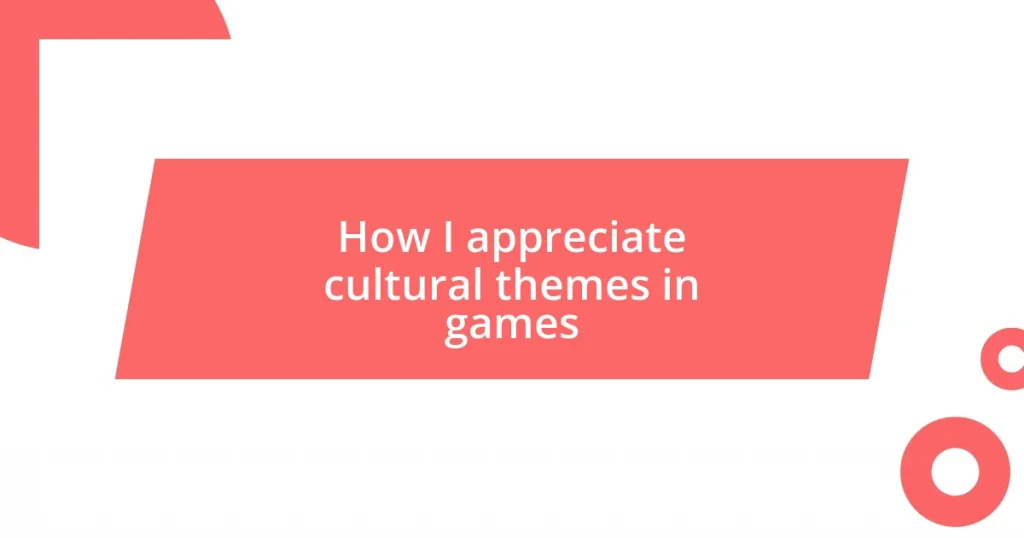Key takeaways:
- Cultural themes in games serve as reflections of societal values and histories, enriching players’ understanding of diverse cultures through immersive storytelling.
- Diversity in character development enhances emotional investment and relatability, prompting players to reflect on their own experiences and the complexities of cultural narratives.
- Community engagement and cross-cultural collaborations in gaming foster empathy and deeper conversations about identity, highlighting the power of shared experiences and perspectives.
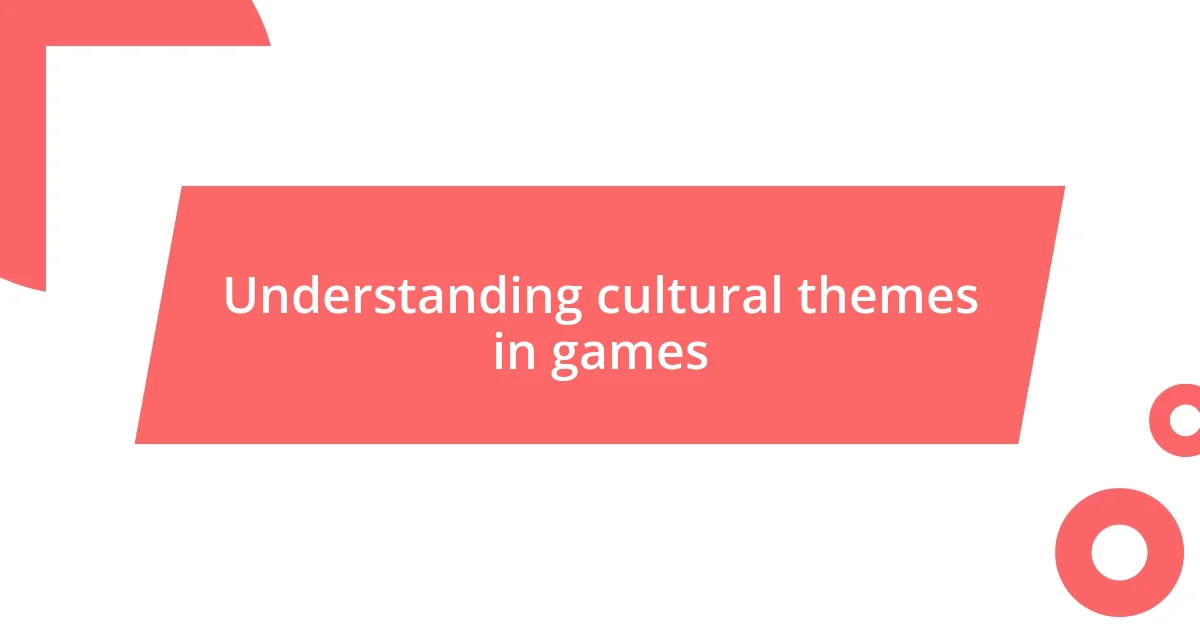
Understanding cultural themes in games
Cultural themes in games are often reflections of the societies from which they emerge. I remember playing Assassin’s Creed: Origins and feeling completely immersed in ancient Egyptian culture. It was fascinating to see how the game captured not just the stunning landscapes and architecture, but also the intricate beliefs and traditions of the time. Have you ever wondered how a game can serve as a time capsule, offering insights into a culture’s values and struggles?
As I navigated through quests, I found myself connecting with the historical figures and their dilemmas. This emotional engagement made me reconsider my understanding of cultural narratives. It’s like each character became a window to the past, prompting me to think about how history shapes our present. How do we, as players, translate these experiences into real-world appreciation of diverse cultures?
When developers weave cultural themes into gameplay, they invite players to experience a slice of life that’s vastly different from their own. For instance, in Ghost of Tsushima, the depiction of samurai honor and tradition resonated deeply with me, personally reflecting on themes of courage and sacrifice. It makes you ask: how can these virtual experiences challenge our perceptions and foster empathy? I believe that embracing these cultural narratives not only enriches our gaming experience but also broadens our understanding of the world we share.
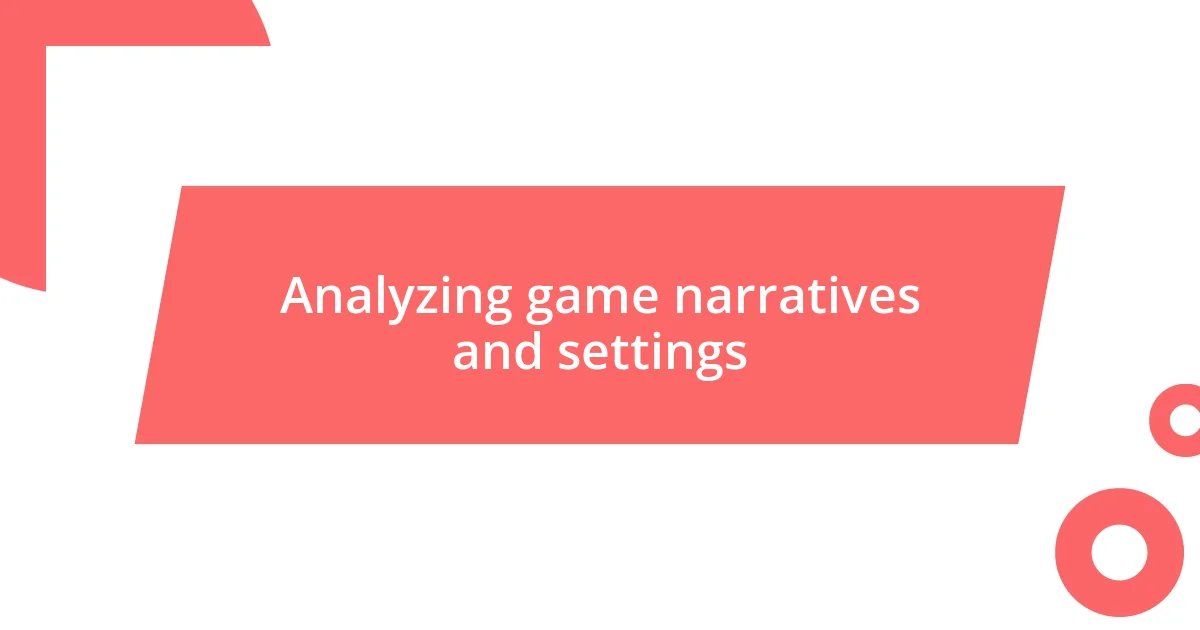
Analyzing game narratives and settings
Analyzing game narratives and settings reveals how deeply a game’s environment can shape its story and themes. I remember playing The Last of Us, where the post-apocalyptic setting wasn’t just a backdrop; it embodied the struggles of humanity in a world that had fallen apart. The way the dilapidated cities told stories of loss and survival made me reflect on our own societal resilience in times of crisis. Don’t you think the setting can be just as influential as the characters themselves?
On another note, the rich narratives found in games like Uncharted 4 captivated me with their historical references and treasure-hunting adventures. The lush landscapes of Madagascar were more than just visually stunning; they provided a canvas for exploring themes of legacy and adventure. As I journeyed alongside the characters, I often thought about how these settings challenge us to explore our own adventurous spirits. Isn’t it amazing how a well-crafted environment can inspire our curiosity and sense of wonder?
When analyzing narratives, it’s crucial to recognize how they reflect cultural intricacies. In Hades, the mythological setting of the Underworld gave me a new perspective on ancient Greek mythology while also allowing for personal growth as I navigated through its challenges. Each interaction with deities and foes revealed layers of emotional depth that went beyond mere gameplay. How does it feel to intertwine personal development with rich storytelling in a game?
| Game | Setting |
|---|---|
| Assassin’s Creed: Origins | Ancient Egypt |
| Ghost of Tsushima | Feudal Japan |
| The Last of Us | Post-Apocalyptic America |
| Uncharted 4 | Modern Madagascar |
| Hades | Mythological Underworld |
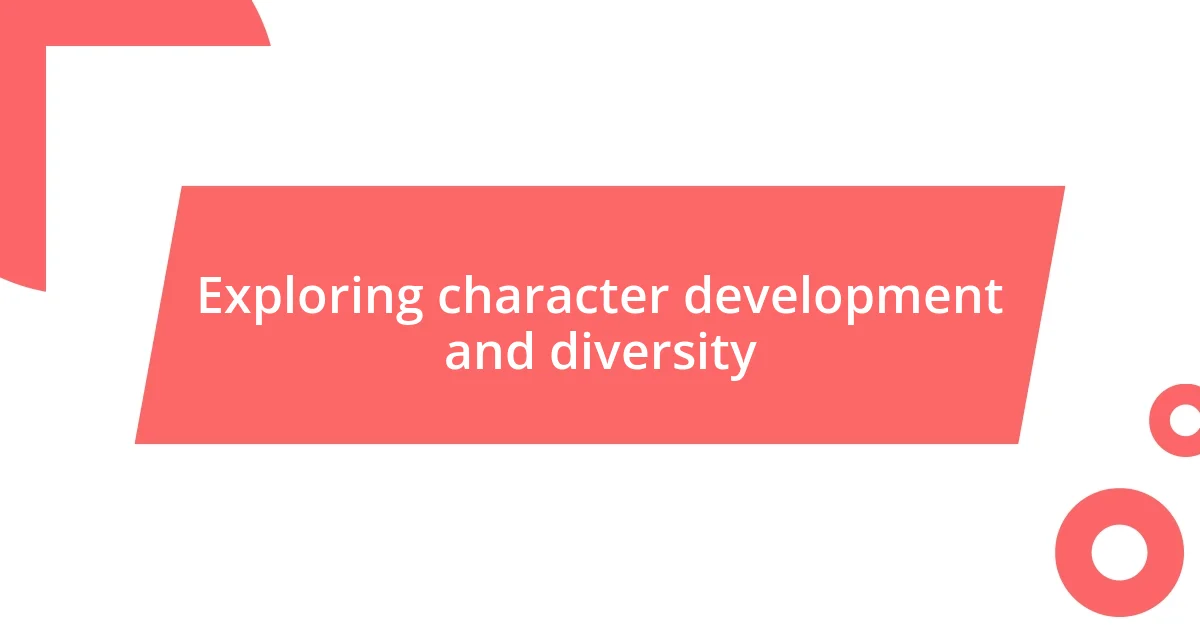
Exploring character development and diversity
When exploring character development, diversity plays a pivotal role in shaping players’ experiences. I fondly remember playing as Aloy in Horizon Zero Dawn, a character whose Inuit-inspired design and background opened my eyes to the rich history of the cultures that influenced her creation. It was refreshing to see a strong female lead who defied stereotypes, and I found myself deeply connected to her journey of self-discovery and resilience in a beautifully crafted world.
- Representation matters: A diverse array of characters can provide players with relatable experiences.
- Complex characterization leads to emotional investment: Personally, I’ve felt more engaged when characters embody real struggles and triumphs.
- Cultural backgrounds enrich narratives: Games that showcase a variety of cultures encourage players to learn and reflect on different perspectives.
Diversity in character arcs also prompts me to contemplate the often-overlooked nuances in their development. For instance, playing as Lee in The Walking Dead deeply affected my perception of moral choices and familial bonds. Each decision carried weight as I guided him through a world filled with complex human emotions, from love to sacrifice. It was a clear reminder of how narratives can weave together various cultural elements to create profound emotional connections that resonate long after the game is over.

Engaging with community perspectives
Engaging with community perspectives offers a unique lens through which to appreciate cultural themes in games. I recall diving into the vibrant discussions surrounding Life is Strange, where players shared personal stories related to the game’s themes of choice and consequence. It amazed me how these conversations revealed the collective experiences of players, often mirroring real-life struggles. Isn’t it interesting to think about how our personal narratives intertwine with those of fictional characters?
Participating in forums and social media groups allowed me to see how different backgrounds influence interpretations of a game’s message. For instance, when discussing Ghost of Tsushima, many players from Japanese backgrounds expressed their emotional connection to the historical aspects and cultural reverence shown in the game. Their insights opened my eyes to nuances I hadn’t considered, making me reflect on how my own cultural lens shapes my understanding of the narratives we play through. Have you ever pondered how the perspectives of others can enrich your own gaming experience?
Moreover, I’ve found that community events, like online discussions or game conventions, can spark enlightening dialogues around cultural themes. During a panel on representation in gaming, I listened as various voices shared how characters from marginalized communities resonated with their own life experiences. It underscored the importance of inclusivity in game narratives, acting as a catalyst for deeper conversations about identity and culture. Isn’t it empowering to see how games can unite people in discussing issues that matter?

Learning from cross-cultural collaborations
Cross-cultural collaborations in the gaming industry reveal a wealth of learning opportunities that can profoundly impact both developers and players. For instance, I remember playing Journey, a game profoundly inspired by Middle Eastern art and culture. The collaborative effort between American and Japanese designers led to a visual and emotional experience that transcended language. It made me reflect on how different cultural backgrounds can merge to create something universally beautiful.
As I engaged with a community of gamers discussing Assassin’s Creed Origins, it was illuminating to hear how the Egyptian setting resonated with those who hailed from the region. One player shared a touching story about visiting the pyramids as a child and how the game reignited those cherished memories. Moments like this really struck me—when players shine a light on their cultural experiences, it becomes clear how collaborations can foster understanding and empathy across geographic boundaries. Have you ever had a gaming moment that echoed a memory from your own life?
Moreover, I find that when gaming studios collaborate internationally, the result is often a richer narrative texture that incorporates diverse perspectives. A powerful example is Overwatch. I was captivated by its diverse cast of characters, each representing various cultures and backgrounds. Hearing the developers speak about their intent to include characters with authentic cultural ties made me appreciate the game even more. It’s a beautiful reminder that collaboration can not only enhance gameplay but also celebrate the tapestry of human experiences. How gratifying is it to think that these games can spark conversations about our differences while highlighting what unites us?
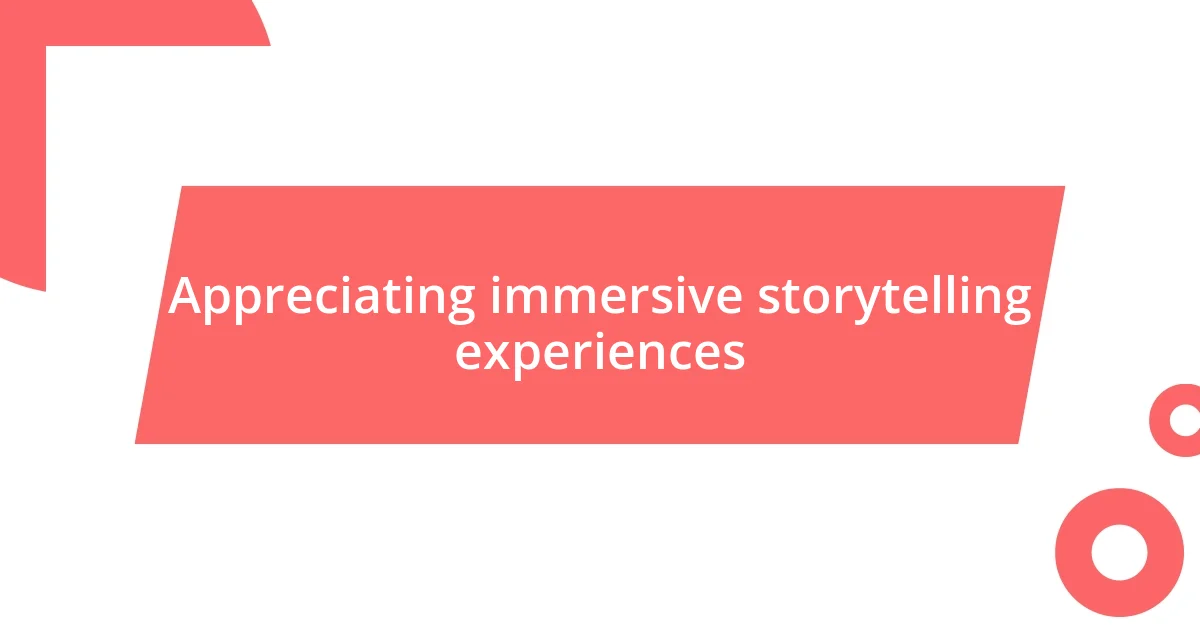
Appreciating immersive storytelling experiences
Immersive storytelling experiences in games have a unique way of drawing us in, making us feel like we’re part of the narrative. I remember my first journey through The Last of Us, where the emotional weight of the characters’ struggles and relationships made me reflect on my own experiences of loss and resilience. How did I find myself so emotionally invested in a fictional world? It’s the power of storytelling combined with relatable themes that creates such a profound connection.
There’s something magical about how a well-crafted game can transport you to another reality, allowing you to explore different cultures and histories. While playing Horizon Zero Dawn, I was fascinated by the blend of ancient traditions and futuristic elements. The way the game weaved storytelling with environmental cues not only kept me captivated but also prompted me to think about the importance of our past in shaping the future. Isn’t it incredible how games can prompt us to examine our own world in a new light?
Reflecting on these experiences, I often find myself pondering how storytelling in games can stimulate empathy and understanding. When I experienced Celeste, a platformer about mental health, it wasn’t just about completing levels; it was about navigating personal struggles and triumphs. Each challenge felt intimate, inviting me to introspect and embrace my own vulnerabilities. Could it be that games offer us a safe space to confront our deepest fears while connecting with others on a similar path? I believe they do, making our shared human experience that much richer.










